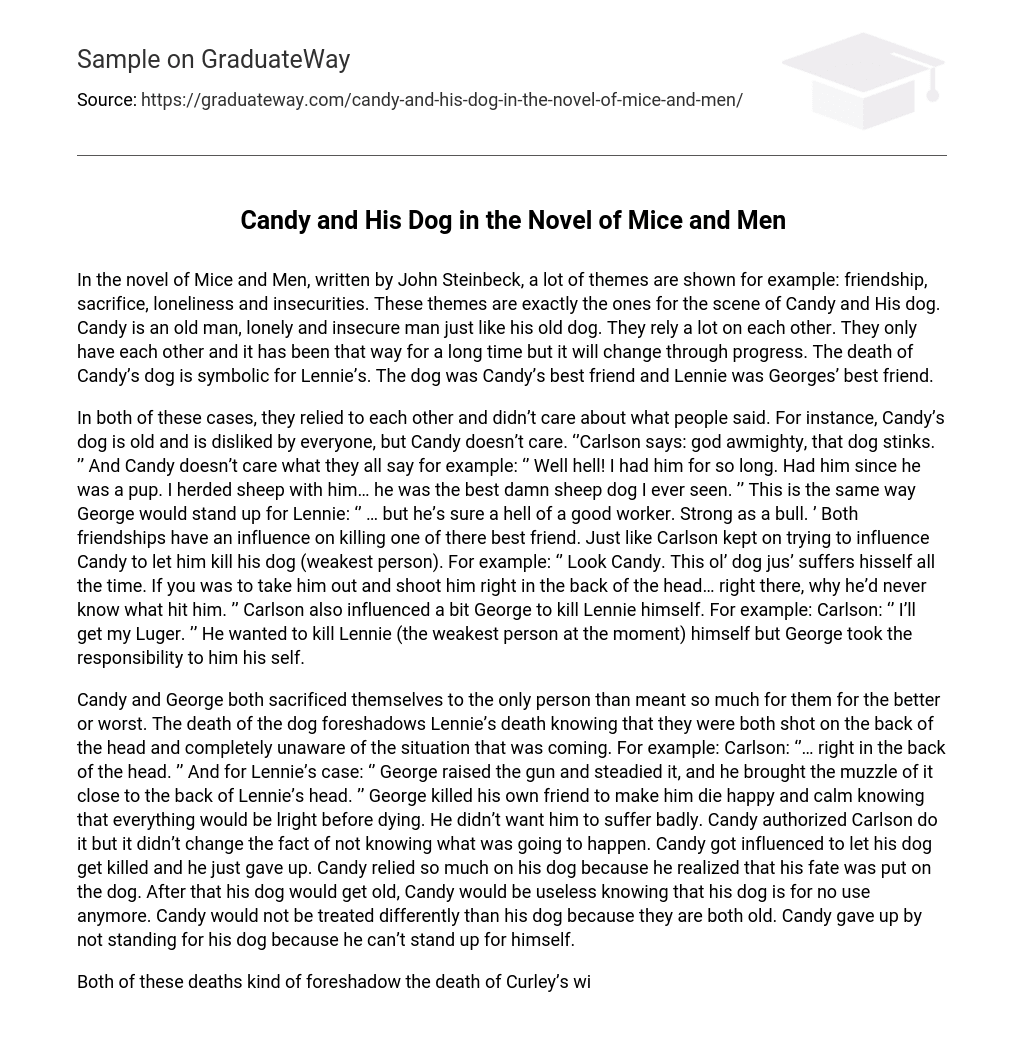In the novel Of Mice and Men, written by John Steinbeck, various themes such as friendship, sacrifice, loneliness, and insecurities are explored. These themes are particularly evident in the scene involving Candy and his dog. Both Candy and his dog are portrayed as old, lonely, and insecure individuals who heavily depend on each other. They have been each other’s only companions for a considerable amount of time, but this dynamic is set to change as progress takes its course. The death of Candy’s dog serves as a symbol for the fate of Lennie, who is George’s closest companion.
In both cases, the characters relied on each other and disregarded the opinions of others. For example, Candy’s dog is old and disliked by everyone. However, Candy doesn’t care about what they say. As an illustration, when Carlson comments on the dog’s smell, Candy responds, “Well hell! I had him for so long. Had him since he was a pup. I herded sheep with him… he was the best damn sheep dog I ever seen.” Similarly, George stands up for Lennie by highlighting his strength and work ethic: “…but he’s sure a hell of a good worker. Strong as a bull.” Both friendships ultimately lead to the killing of their best friend. Carlson persistently tries to convince Candy to let him shoot his dog, who is seen as the weakest member of their group. For instance, he suggests, “Look Candy. This ol’ dog jus’ suffers hisself all the time. If you [were to] take him out and shoot him right in the back of the head… right there, why he’d never know what hit him.” Additionally, Carlson subtly influences George to take on the responsibility of killing Lennie himself. For instance, when Carlson says, “I’ll get my Luger,” he implies that he wants to kill Lennie (who is currently in a vulnerable state), but George ultimately decides to take matters into his own hands.
Both Candy and George made sacrifices for the person who meant everything to them, whether it be for better or worse. The death of Candy’s dog foreshadows Lennie’s death, as they were both shot in the back of the head, completely unaware of what was coming. For instance, Carlson remarks, “right in the back of the head,” and in Lennie’s case, George raises the gun and aims it at the back of Lennie’s head. George kills his friend to ensure a peaceful and happy death, sparing him from further suffering. Candy agrees to let Carlson do it, but this doesn’t change the fact that they both didn’t know what would happen. Candy relied heavily on his dog because he recognized that his own fate was linked to his dog’s. Once the dog became old and useless, Candy realized he would also be treated as such. By not defending his dog, Candy effectively gives up on himself as well.
These deaths foreshadow the death of Curley’s wife; in all cases, the back of their head was injured. Notably, many deaths occur by this means. Additionally, both friendships contain an animalistic element. Lennie, despite his immense strength, acts childishly and resembles a big baby. Similarly, Candy’s relationship involves a dog who is no longer useful due to age and becomes a nuisance with its foul odor. Consequently, with permission from the owner, Carlson ends the dog’s life, as it poses problems for everyone involved.
Candy gave Carlson permission to kill his dog because he believed it was time to end its suffering. Similarly, after Lennie accidentally killed Curley’s wife, he tried to hide to avoid trouble. However, Curley’s wife’s death upset many people, leading them to pursue Lennie with the intention of killing him. George decided to take matters into his own hands and ensure that Lennie died peacefully and unaware of his fate. Despite knowing that this decision would bring trouble, George believed it was necessary and the right thing to do. It is common for us to seek out and kill animals when necessary.
Both deaths share commonalities in the sense that both individuals were pursued in a manner that ultimately resulted in their demise. The bonds of friendship between them were exceptionally strong and difficult to sever. The decision to let them go was prompted by similar circumstances and underlying purposes. Additionally, they both exhibited signs that foreshadowed their impending demise, indicating similarities between their situations. Both the dog and Lennie posed more challenges than benefits, leading to their eventual release over time. Tragically, the victims perished without knowledge of the impending harm that awaited them. Would you willingly end the life of someone you have cherished and known for countless years?





